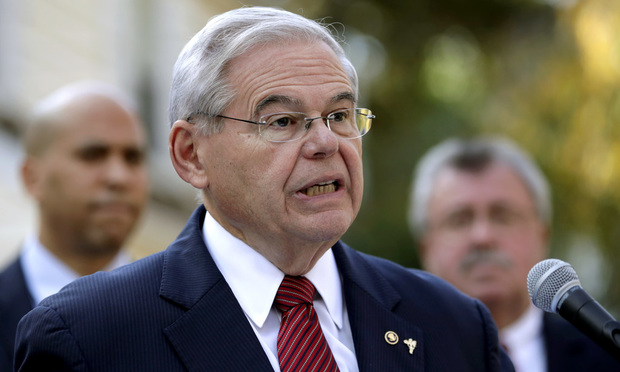Second Menendez Trial Seen as Likely After Deadlock Leads to Mistrial
U.S. Sen. Bob Menendez's troubles may not be over as former prosecutors predicted in the wake of the mistrial that he's likely to face a retrial.
November 16, 2017 at 05:59 PM
15 minute read
 U.S. Sen. Bob Menendez.
U.S. Sen. Bob Menendez. U.S. Sen. Bob Menendez, D-New Jersey, cried tears of relief Thursday after a mistrial was declared in his two-month corruption trial. But his troubles may not be over—former prosecutors predicted in the wake of the mistrial that he's likely to face a retrial.
U.S. District Judge William Walls declared a mistrial after jurors reported for the second time in three days that they could not reach a unanimous verdict on corruption charges against Menendez and his co-defendant, Florida eye doctor Salomon Melgen. Several media outlets, quoting a dismissed juror, said 10 of the 12 members of the panel favored acquittal.
Outside the federal courthouse in Newark, Menendez gave thanks to God for the retrial. “It is by his grace that I was delivered from an unjust prosecution,” he told a group of reporters. “I want to thank the jury—12 New Jerseyans who saw through the government's false claims and used their New Jersey common sense to reject [the charges]. The way this case started was wrong. The way it was investigated was wrong. The way it was prosecuted was wrong, and the way it was tried was wrong.”
A statement from Justice Department spokeswoman Nicole Oxman after the mistrial was declared gave no indication of the government's future plans. “The Department of Justice appreciates the jury's service in this lengthy trial. The department will carefully consider [its] next steps in this important matter and report to the court at the appropriate time,” the statement said.
Although prosecutors could drop the case, lawyers who've held similar roles say they expect the government will retry the case against Menendez.
“Expect the government to ask for a trial date in the near future,” said Carrie Cohen, a white-collar defense attorney at Morrison & Foerster in New York. “Public corruption cases are difficult to prove, perhaps even more so in the post-McDonnell era. But prosecutors will continue to bring cases when they believe the law has been broken.”
Cohen, who led the prosecution of Sheldon Silver on corruption and money laundering charges while serving as an assistant U.S. attorney in the Southern District of New York, said that in a second trial of Menendez the prosecution would have an advantage that was not available in the first—it has more insight into the defense's strategy, after seeing the cross-examination of government witnesses. And for a second trial, the prosecution would have the opportunity to beef up their evidence, or try to find additional evidence, or use evidence they did not introduce, Cohen said. In addition, the prosecution might be able to find a different way to react to the defense argument that the gifts from Melgen to Menendez were merely expressions of friendship and not bribes, Cohen said.
“If I believe in the strength of the case, I'm going to retry the case. I don't think the government is going to be particularly concerned in a case like this about the public's perception as to whether they're flogging a dead horse,” said Riza Dagli, chairman of Brach Eichler's criminal defense practice group in Roseland and a former assistant attorney general and director of New Jersey's Medicaid Fraud Unit.
The only thing likely to stop the government from retrying the case is a guilty plea from Menendez to a lesser offense, Dagli said.
Dagli said such a resolution is unlikely. “I think both sides are looking for total victory, rather than a compromise,” he said.
In a retrial, the prosecution will have to focus on “what a senator is and what a senator isn't—what's appropriate and what's not appropriate,” Dagli said, in light of the defense argument that Melgen's gifts to Menendez were expressions of friendship. The issue was highlighted, Dagli said, by a juror's seemingly simplistic question from the jury room on the first full day of deliberations, “What is a senator?”
David Weinstein of Hinshaw & Culberton in Miami, a former assistant U.S. attorney in the Southern District of Florida, said his “gut reaction” is that Menendez will be tried again, with the caveat that the indictment was brought under a different attorney general the first time around. Menendez was charged during the Obama administration by a Justice Department led by Attorney General Loretta Lynch.
But a decision on whether to bring the case a second time would require a close look at whether the proofs in the case support a finding that Menendez carried out official acts on Melgen's behalf. Apparently the jurors didn't accept the prosecution's assertions that Menendez performed official acts on Melgen's behalf, Weinstein said.
“To obtain a bribery conviction, you have to show what Menendez did was intended to influence the outcome. It's not just enough for somebody to get a gift or handout and the person that receives it has to do something in his or her official capacity,” Weinstein said.
In addition, the stream of benefits theory of bribery that was at the base of the Menendez trial will make the prosecution's job harder in the next trial, Weinstein said. A stream of benefits timeline doesn't provide the tidy narrative that jurors are often seeking, he said.
“Especially now, given the nature of reality television and the fact that everybody has a video recording device on them, jurors expect things to happen in sequence and for there to be video,” Weinstein said.
Walls declared the mistrial at around 1 p.m. Thursday after the jury sent him a note reporting that it was deadlocked. The judge interviewed jurors individually in chambers before calling the case a mistrial.
Jurors said in their note that they “reviewed the evidence slowly, thoroughly and in great detail,” according to NorthJersey.com. “We have each tried to look at this case from different viewpoints, but still feel strongly in our positions, nor are we willing to move away from our strong convictions,” the jury's note said, as it was read in court by a defense attorney.
This content has been archived. It is available through our partners, LexisNexis® and Bloomberg Law.
To view this content, please continue to their sites.
Not a Lexis Subscriber?
Subscribe Now
Not a Bloomberg Law Subscriber?
Subscribe Now
NOT FOR REPRINT
© 2025 ALM Global, LLC, All Rights Reserved. Request academic re-use from www.copyright.com. All other uses, submit a request to [email protected]. For more information visit Asset & Logo Licensing.
You Might Like
View All


Trending Stories
- 1'It's Not Going to Be Pretty': PayPal, Capital One Face Novel Class Actions Over 'Poaching' Commissions Owed Influencers
- 211th Circuit Rejects Trump's Emergency Request as DOJ Prepares to Release Special Counsel's Final Report
- 3Supreme Court Takes Up Challenge to ACA Task Force
- 4'Tragedy of Unspeakable Proportions:' Could Edison, DWP, Face Lawsuits Over LA Wildfires?
- 5Meta Pulls Plug on DEI Programs
Who Got The Work
Michael G. Bongiorno, Andrew Scott Dulberg and Elizabeth E. Driscoll from Wilmer Cutler Pickering Hale and Dorr have stepped in to represent Symbotic Inc., an A.I.-enabled technology platform that focuses on increasing supply chain efficiency, and other defendants in a pending shareholder derivative lawsuit. The case, filed Oct. 2 in Massachusetts District Court by the Brown Law Firm on behalf of Stephen Austen, accuses certain officers and directors of misleading investors in regard to Symbotic's potential for margin growth by failing to disclose that the company was not equipped to timely deploy its systems or manage expenses through project delays. The case, assigned to U.S. District Judge Nathaniel M. Gorton, is 1:24-cv-12522, Austen v. Cohen et al.
Who Got The Work
Edmund Polubinski and Marie Killmond of Davis Polk & Wardwell have entered appearances for data platform software development company MongoDB and other defendants in a pending shareholder derivative lawsuit. The action, filed Oct. 7 in New York Southern District Court by the Brown Law Firm, accuses the company's directors and/or officers of falsely expressing confidence in the company’s restructuring of its sales incentive plan and downplaying the severity of decreases in its upfront commitments. The case is 1:24-cv-07594, Roy v. Ittycheria et al.
Who Got The Work
Amy O. Bruchs and Kurt F. Ellison of Michael Best & Friedrich have entered appearances for Epic Systems Corp. in a pending employment discrimination lawsuit. The suit was filed Sept. 7 in Wisconsin Western District Court by Levine Eisberner LLC and Siri & Glimstad on behalf of a project manager who claims that he was wrongfully terminated after applying for a religious exemption to the defendant's COVID-19 vaccine mandate. The case, assigned to U.S. Magistrate Judge Anita Marie Boor, is 3:24-cv-00630, Secker, Nathan v. Epic Systems Corporation.
Who Got The Work
David X. Sullivan, Thomas J. Finn and Gregory A. Hall from McCarter & English have entered appearances for Sunrun Installation Services in a pending civil rights lawsuit. The complaint was filed Sept. 4 in Connecticut District Court by attorney Robert M. Berke on behalf of former employee George Edward Steins, who was arrested and charged with employing an unregistered home improvement salesperson. The complaint alleges that had Sunrun informed the Connecticut Department of Consumer Protection that the plaintiff's employment had ended in 2017 and that he no longer held Sunrun's home improvement contractor license, he would not have been hit with charges, which were dismissed in May 2024. The case, assigned to U.S. District Judge Jeffrey A. Meyer, is 3:24-cv-01423, Steins v. Sunrun, Inc. et al.
Who Got The Work
Greenberg Traurig shareholder Joshua L. Raskin has entered an appearance for boohoo.com UK Ltd. in a pending patent infringement lawsuit. The suit, filed Sept. 3 in Texas Eastern District Court by Rozier Hardt McDonough on behalf of Alto Dynamics, asserts five patents related to an online shopping platform. The case, assigned to U.S. District Judge Rodney Gilstrap, is 2:24-cv-00719, Alto Dynamics, LLC v. boohoo.com UK Limited.
Featured Firms
Law Offices of Gary Martin Hays & Associates, P.C.
(470) 294-1674
Law Offices of Mark E. Salomone
(857) 444-6468
Smith & Hassler
(713) 739-1250







